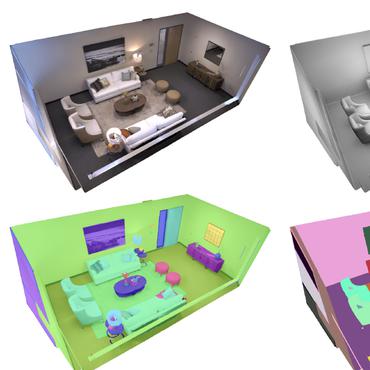Search Results for author: Yipeng Qin
Found 23 papers, 12 papers with code
LATUP-Net: A Lightweight 3D Attention U-Net with Parallel Convolutions for Brain Tumor Segmentation
no code implementations • 9 Apr 2024 • Ebtihal J. Alwadee, Xianfang Sun, Yipeng Qin, Frank C. Langbein
The proposed architecture, a Lightweight 3D ATtention U-Net with Parallel convolutions, LATUP-Net, addresses these issues.
NeRF-HuGS: Improved Neural Radiance Fields in Non-static Scenes Using Heuristics-Guided Segmentation
no code implementations • 26 Mar 2024 • Jiahao Chen, Yipeng Qin, Lingjie Liu, Jiangbo Lu, Guanbin Li
Neural Radiance Field (NeRF) has been widely recognized for its excellence in novel view synthesis and 3D scene reconstruction.
Deep Generative Model based Rate-Distortion for Image Downscaling Assessment
1 code implementation • 22 Mar 2024 • Yuanbang Liang, Bhavesh Garg, Paul L Rosin, Yipeng Qin
Our main idea is that downscaling and super-resolution (SR) can be viewed as the encoding and decoding processes in the rate-distortion model, respectively, and that a downscaling algorithm that preserves more details in the resulting low-resolution (LR) images should lead to less distorted high-resolution (HR) images in SR.
PICTURE: PhotorealistIC virtual Try-on from UnconstRained dEsigns
no code implementations • 7 Dec 2023 • Shuliang Ning, Duomin Wang, Yipeng Qin, Zirong Jin, Baoyuan Wang, Xiaoguang Han
Unlike prior arts constrained by specific input types, our method allows flexible specification of style (text or image) and texture (full garment, cropped sections, or texture patches) conditions.
Feature Proliferation -- the "Cancer" in StyleGAN and its Treatments
1 code implementation • ICCV 2023 • Shuang Song, Yuanbang Liang, Jing Wu, Yu-Kun Lai, Yipeng Qin
Thanks to our discovery of Feature Proliferation, the proposed feature rescaling method is less destructive and retains more useful image features than the truncation trick, as it is more fine-grained and works in a lower-level feature space rather than a high-level latent space.
Improved Distribution Matching for Dataset Condensation
2 code implementations • CVPR 2023 • Ganlong Zhao, Guanbin Li, Yipeng Qin, Yizhou Yu
In this paper, we propose a novel dataset condensation method based on distribution matching, which is more efficient and promising.
Universal Semi-supervised Model Adaptation via Collaborative Consistency Training
no code implementations • 7 Jul 2023 • Zizheng Yan, Yushuang Wu, Yipeng Qin, Xiaoguang Han, Shuguang Cui, Guanbin Li
In this paper, we introduce a realistic and challenging domain adaptation problem called Universal Semi-supervised Model Adaptation (USMA), which i) requires only a pre-trained source model, ii) allows the source and target domain to have different label sets, i. e., they share a common label set and hold their own private label set, and iii) requires only a few labeled samples in each class of the target domain.
Exploration and Exploitation of Unlabeled Data for Open-Set Semi-Supervised Learning
no code implementations • 30 Jun 2023 • Ganlong Zhao, Guanbin Li, Yipeng Qin, Jinjin Zhang, Zhenhua Chai, Xiaolin Wei, Liang Lin, Yizhou Yu
In this paper, we address a complex but practical scenario in semi-supervised learning (SSL) named open-set SSL, where unlabeled data contain both in-distribution (ID) and out-of-distribution (OOD) samples.
Parametric Implicit Face Representation for Audio-Driven Facial Reenactment
no code implementations • CVPR 2023 • Ricong Huang, Peiwen Lai, Yipeng Qin, Guanbin Li
In this work, we break these trade-offs with our novel parametric implicit face representation and propose a novel audio-driven facial reenactment framework that is both controllable and can generate high-quality talking heads.
Motion-R3: Fast and Accurate Motion Annotation via Representation-based Representativeness Ranking
no code implementations • 4 Apr 2023 • Jubo Yu, Tianxiang Ren, Shihui Guo, Fengyi Fang, Kai Wang, Zijiao Zeng, Yazhan Zhang, Andreas Aristidou, Yipeng Qin
In this paper, we follow a data-centric philosophy and propose a novel motion annotation method based on the inherent representativeness of motion data in a given dataset.
Diverse Motion In-betweening with Dual Posture Stitching
no code implementations • 25 Mar 2023 • Tianxiang Ren, Jubo Yu, Shihui Guo, Ying Ma, Yutao Ouyang, Zijiao Zeng, Yazhan Zhang, Yipeng Qin
In-betweening is a technique for generating transitions given initial and target character states.
Reduced-Reference Quality Assessment of Point Clouds via Content-Oriented Saliency Projection
1 code implementation • 18 Jan 2023 • Wei Zhou, Guanghui Yue, Ruizeng Zhang, Yipeng Qin, Hantao Liu
Many dense 3D point clouds have been exploited to represent visual objects instead of traditional images or videos.
Centrality and Consistency: Two-Stage Clean Samples Identification for Learning with Instance-Dependent Noisy Labels
1 code implementation • 29 Jul 2022 • Ganlong Zhao, Guanbin Li, Yipeng Qin, Feng Liu, Yizhou Yu
In this paper, we propose a two-stage clean samples identification method to address the aforementioned challenge.
 Ranked #3 on
Image Classification
on Clothing1M
(using extra training data)
Ranked #3 on
Image Classification
on Clothing1M
(using extra training data)
Exploring and Exploiting Hubness Priors for High-Quality GAN Latent Sampling
1 code implementation • 13 Jun 2022 • Yuanbang Liang, Jing Wu, Yu-Kun Lai, Yipeng Qin
Despite the extensive studies on Generative Adversarial Networks (GANs), how to reliably sample high-quality images from their latent spaces remains an under-explored topic.
Multi-level Consistency Learning for Semi-supervised Domain Adaptation
1 code implementation • 9 May 2022 • Zizheng Yan, Yushuang Wu, Guanbin Li, Yipeng Qin, Xiaoguang Han, Shuguang Cui
Semi-supervised domain adaptation (SSDA) aims to apply knowledge learned from a fully labeled source domain to a scarcely labeled target domain.
 Ranked #1 on
Semi-supervised Domain Adaptation
on VisDA2017
Ranked #1 on
Semi-supervised Domain Adaptation
on VisDA2017
Real-World Blind Super-Resolution via Feature Matching with Implicit High-Resolution Priors
2 code implementations • 26 Feb 2022 • Chaofeng Chen, Xinyu Shi, Yipeng Qin, Xiaoming Li, Xiaoguang Han, Tao Yang, Shihui Guo
Unlike image-space methods, our FeMaSR restores HR images by matching distorted LR image {\it features} to their distortion-free HR counterparts in our pretrained HR priors, and decoding the matched features to obtain realistic HR images.
PVSeRF: Joint Pixel-, Voxel- and Surface-Aligned Radiance Field for Single-Image Novel View Synthesis
no code implementations • 10 Feb 2022 • Xianggang Yu, Jiapeng Tang, Yipeng Qin, Chenghong Li, Linchao Bao, Xiaoguang Han, Shuguang Cui
We present PVSeRF, a learning framework that reconstructs neural radiance fields from single-view RGB images, for novel view synthesis.
Pixel-level Intra-domain Adaptation for Semantic Segmentation
no code implementations • ACM International Conference on Multimedia 2021 • Zizheng Yan, Xianggang Yu, Yipeng Qin, Yushuang Wu, Xiaoguang Han, Shuguang Cui
Recent advances in unsupervised domain adaptation have achieved remarkable performance on semantic segmentation tasks.
Improved StyleGAN Embedding: Where are the Good Latents?
3 code implementations • 13 Dec 2020 • Peihao Zhu, Rameen Abdal, Yipeng Qin, John Femiani, Peter Wonka
First, we introduce a new normalized space to analyze the diversity and the quality of the reconstructed latent codes.
SEAN: Image Synthesis with Semantic Region-Adaptive Normalization
1 code implementation • CVPR 2020 • Peihao Zhu, Rameen Abdal, Yipeng Qin, Peter Wonka
Using SEAN normalization, we can build a network architecture that can control the style of each semantic region individually, e. g., we can specify one style reference image per region.
Image2StyleGAN++: How to Edit the Embedded Images?
3 code implementations • CVPR 2020 • Rameen Abdal, Yipeng Qin, Peter Wonka
We propose Image2StyleGAN++, a flexible image editing framework with many applications.
Image2StyleGAN: How to Embed Images Into the StyleGAN Latent Space?
5 code implementations • ICCV 2019 • Rameen Abdal, Yipeng Qin, Peter Wonka
We propose an efficient algorithm to embed a given image into the latent space of StyleGAN.
How does Lipschitz Regularization Influence GAN Training?
no code implementations • ECCV 2020 • Yipeng Qin, Niloy Mitra, Peter Wonka
In this work, we uncover an even more important effect of Lipschitz regularization by examining its impact on the loss function: It degenerates GAN loss functions to almost linear ones by restricting their domain and interval of attainable gradient values.













